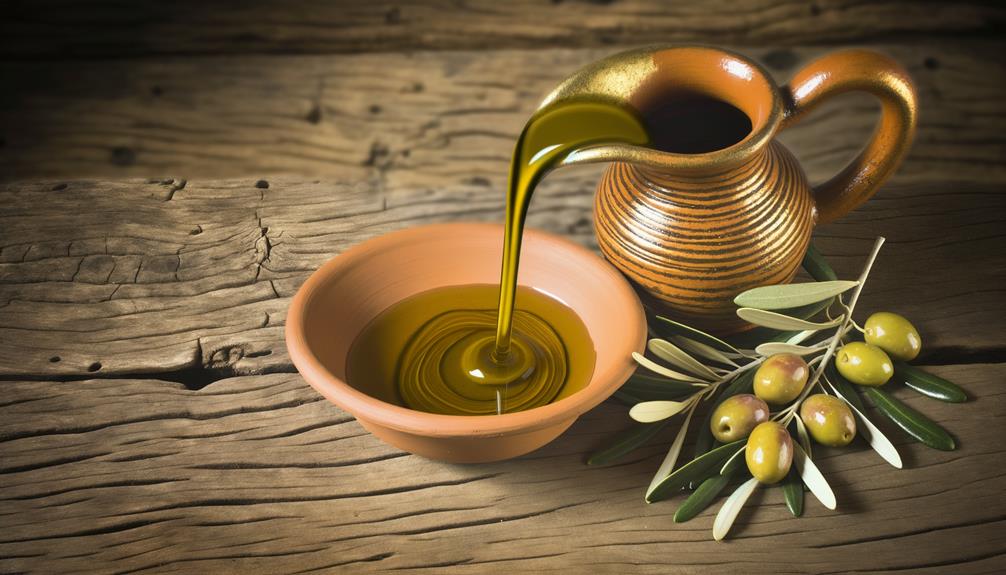Imagine you’re strolling through a small, sun-soaked village on the Mediterranean coast, where olive oil isn’t just a cooking ingredient; it’s a way of life. You’ve probably heard about its myriad health benefits, from reducing heart disease risk to improving skin health, thanks to its rich content of monounsaturated fats and antioxidants. But beyond its health perks, olive oil brings a depth of flavor to dishes that’s hard to match. Whether drizzled over a fresh salad or used to sauté your favorite vegetables, it’s the backbone of Mediterranean cuisine for good reasons. However, with the vast array of types and qualities available, how do you ensure you’re making the most ethical and health-conscious choice? Let’s explore the nuances of olive oil, unraveling its complex flavors and textures, and discover how this ancient ingredient can elevate your culinary creations while nurturing your well-being.
Key Takeaways
- Olive oil has a rich history and cultural significance, being cultivated for over 6,000 years and used in ancient civilizations for its nutritional and medicinal properties.
- There are different varieties of olive oil, each with unique flavors and health benefits, making it a versatile ingredient in cooking and adding depth to dishes.
- The extraction methods of olive oil, such as mechanical pressing and cold-pressing, ensure high-quality and unadulterated oil, with regulatory standards set by organizations like the International Olive Council.
- Olive oil consumption is increasing globally due to its health benefits, culinary flexibility, and use in various industries, and incorporating it into the diet supports overall health and well-being.
History and Origins
The fascinating journey of olive oil begins in the ancient Mediterranean, where it was first cultivated for its nutritional and medicinal properties over 6,000 years ago. Imagine the golden liquid, a gift from nature, being discovered by early civilizations who recognized its value not just as a food source but as a cornerstone of health and wellness. You’re tapping into a tradition that has stood the test of time, offering a blend of rich flavors and health benefits that have been cherished through millennia.
Olive oil’s history is intertwined with the very fabric of Mediterranean culture, serving as a symbol of peace and prosperity. It’s fascinating to think about how this precious oil was once traded across ancient civilizations, becoming a staple in diets, a base for medicines, and even used in sacred rituals. Today, you continue this tradition every time you drizzle olive oil over a dish, infusing it with not just flavor but a touch of history. By choosing olive oil, you’re not only enhancing your meals but also embracing a lifestyle focused on wellness and the ethical enjoyment of nature’s bounty. It’s a simple yet profound way to honor the past while nourishing the present.
Varieties Explained
While you’ve been savoring the rich history of olive oil, it’s also essential to explore the diverse varieties that offer unique flavors and health benefits to your table. Olive oil isn’t just a single note in your culinary orchestra; it’s a symphony of tastes, textures, and aromas that can elevate any dish you’re passionate about serving. From the light, fruity notes of an Arbequina to the robust, peppery finish of a Koroneiki, each variety brings its own character and healthful advantages.
When selecting olive oil for your next meal or health regimen, consider these notable varieties:
- Arbequina: Known for its delicate, fruity flavor, it’s perfect for dressings or drizzling over fresh bread. Its high concentration of polyphenols adds an antioxidant boost to your dishes.
- Picual: Offers a more intense flavor profile with hints of tomato and fig. Its stability under heat makes it ideal for frying and sautéing, offering both taste and health benefits.
- Koroneiki: Praised for its strong, peppery finish, it’s excellent for adding depth to soups and stews. Additionally, its high oleic acid content can support cardiovascular health.
As you delve into the world of olive oil, remember you’re not just cooking; you’re nurturing, healing, and creating joy for those you serve.
Culinary Uses
Have you ever considered how olive oil, a staple of healthful cooking, can transform the simplest ingredients into a gourmet experience? This versatile oil, available in various flavors and textures, lends itself to a myriad of culinary uses. Whether you’re frying, dressing a salad, or finishing off a dish with a drizzle, olive oil elevates your cooking with not only flavor but a touch of wellness.
Utilizing olive oil in your kitchen isn’t just about making food taste better; it’s about nurturing those you serve with meals that are as nutritious as they are delicious. Here’s how you can incorporate olive oil into your culinary repertoire:
| Application | Recommendation |
|---|---|
| Frying | Use refined olive oils for their high smoke point and neutral taste, ensuring your fried foods are both delicious and healthier. |
| Salad Dressings | Combine extra virgin olive oil with vinegar for classic vinaigrettes, adding a robust flavor to fresh salads. |
| Finishing Oil | Drizzle extra virgin olive oil over dishes before serving to enhance flavor with its distinct texture and taste. |
Experiment with different olive oil varieties to discover how each can uniquely accentuate your dishes, offering a culinary journey that’s as enriching for the palate as it is for the soul.
Extraction Methods
Delving into olive oil’s heart, its extraction methods range from traditional stone milling to advanced centrifugation, each preserving the essence and health benefits of this liquid gold. You’re not just choosing a cooking ingredient; you’re selecting a staple of health and heritage that has been cherished across generations. Here’s a closer look at how olive oil comes into being:
- Mechanical pressing involves crushing olives to release the oil. This method is as straightforward as it sounds, yet it requires precision to ensure the highest quality oil.
- Centrifugation separates the oil from solids and water by spinning the olive paste. This modern technique ensures a pure, unadulterated product.
- Cold-pressing preserves the oil’s quality and flavor by using low temperatures. It’s a method that respects the ingredient, ensuring you get all the health benefits without compromising taste.
Choosing olive oil extracted through these methods means you’re not just serving food; you’re enriching meals with a touch of history, a dash of technology, and a commitment to well-being. It’s about bringing a piece of the Mediterranean’s soul to your table, offering not just nourishment, but a legacy of health and flavor.
Global Consumption Trends
As global palates evolve, more people are embracing olive oil, not just for its rich flavors but also for its numerous health benefits, making it a cornerstone of a health-conscious lifestyle. This surge in popularity is mirrored in the steady increase in global consumption, with Spain leading the charge as the top producer, followed closely by Italy, Greece, Tunisia, Turkey, and Morocco. The Mediterranean diet, renowned for its emphasis on olive oil, has captivated individuals worldwide, inspiring many to integrate this liquid gold into their daily meals for a touch of both tradition and health.
The quest for high-quality, extra virgin olive oil is on the rise, fueled by a growing recognition of its health advantages and culinary flexibility. It’s not just your kitchen that olive oil has found a place in; its usage spans cosmetics, pharmaceuticals, and even traditional oil lamps, showcasing its versatility and the global shift towards natural, healthier living choices.
This trend of weaving olive oil into various cuisines and aspects of life underscores a collective move towards embracing healthier, more sustainable lifestyle choices, where serving others begins with serving oneself the very best of nature’s offerings.
Regulatory Standards
While embracing the health and culinary benefits of olive oil, it’s vital to understand the regulatory standards that ensure the quality and authenticity of every bottle you enjoy. These standards, set by the International Olive Council (IOC) and local government bodies, serve as a beacon of trust and quality in the olive oil industry. They’re designed not only to protect you, the consumer but also to uphold fair trade practices and the global reputation of olive oil producers.
Here’s what these regulations typically cover:
- Categories and Grades: Differentiating between extra virgin, virgin, and refined olive oils based on strict criteria.
- Quality Parameters: Regulating acidity levels, peroxide value, sensory characteristics, and chemical composition to classify olive oil by grade.
- Processing and Storage: Ensuring olive oil producers adhere to rigorous processing, storage, and packaging guidelines to maintain oil quality and safety.
Key Constituents
What makes olive oil a cornerstone of your healthy diet? Its key constituents — oleic acid, monounsaturated fats, antioxidants, vitamins E and K, and polyphenols — play a pivotal role in promoting well-being and preventing various health issues. These elements are the heroes behind olive oil’s remarkable ability to fend off heart disease, mitigate stroke risks, and bolster overall heart health. They’re not just good for your heart; they also champion your body’s fight against inflammation, making olive oil an indispensable ally in your kitchen and beyond.
The benefits don’t stop there. Olive oil’s constituents have been shown to aid in weight management, reduce the risk of type 2 diabetes, and even offer protective effects against certain types of cancer. For those suffering from rheumatoid arthritis, its anti-inflammatory properties can be a source of relief. Furthermore, its antibacterial qualities and ability to maintain optimal blood sugar levels underscore its versatility and importance in a health-focused lifestyle.
When selecting olive oil, remember that its quality, purity, and origin significantly influence its health benefits and culinary attributes. Each variety and brand brings its unique flavor profile and uses, enriching your cooking and serving experiences while nurturing health and well-being.
Nutritional Profile
Having explored the key constituents that make olive oil a staple in promoting health, let’s now examine its nutritional profile to understand how it supports your well-being. Olive oil is a powerhouse of nutrients that play a crucial role in maintaining and enhancing health. Its composition is a blend of fats that benefits your heart, brain, and overall body in numerous ways. Here’s a glimpse into what makes olive oil so special:
- Rich in Healthy Fats: About 73% of olive oil is monounsaturated fat, oleic acid, known for its anti-inflammatory effects and beneficial impacts on genes related to cancer.
- Packed with Antioxidants: Vitamins E and K, along with polyphenols like oleocanthal, contribute to its antioxidant profile, protecting against chronic diseases, fighting inflammation, and safeguarding blood cholesterol from oxidation.
- Diverse Health Benefits: The consumption of olive oil is linked to a lower risk of heart disease, stroke, and type 2 diabetes. It also supports weight management and brain health while possessing antibacterial properties.
Incorporating olive oil into your diet isn’t just a treat for your taste buds; it’s a gesture of care towards your body. Its nutritional profile makes it an invaluable ally in your journey towards a healthier lifestyle.
Health Benefits
Diving into the health benefits of olive oil reveals how its rich nutritional content can significantly bolster your heart health and reduce disease risk. This golden elixir is brimming with monounsaturated fats, a heart-healthy choice that can help keep cardiovascular diseases at bay. By incorporating olive oil into your meals, you’re not just adding a touch of Mediterranean flair; you’re actively participating in the preservation of your heart’s well-being.
Olive oil’s antioxidants, including vitamins E and K, are your body’s allies in the fight against oxidation, a process that can harm your cholesterol levels and set the stage for chronic diseases. But the benefits don’t stop there. The anti-inflammatory properties of especially extra virgin olive oil could be a game-changer for those battling conditions like rheumatoid arthritis, offering a natural way to ease discomfort and inflammation.
Moreover, embracing olive oil as part of a balanced Mediterranean diet could be your strategy against type 2 diabetes and an ally in managing your weight effectively. It’s also been linked to protective effects against Alzheimer’s disease, certain cancers, and a decline in brain function. In essence, choosing olive oil is not just about elevating your culinary experiences—it’s a commitment to nurturing your health and that of those you serve.
Frequently Asked Questions
What Is Olive Oil Good For?
You’re wondering what’s so special, right? It’s a key to unlocking better health, slashing bad cholesterol, fighting off chronic diseases, and keeping your heart robust. Plus, it’s your secret ingredient for radiant skin and hair.
Is It Good to Eat Olive Oil Everyday?
Yes, it’s beneficial for you to include it in your daily diet. It’s packed with heart-healthy fats and antioxidants, reducing your risk of chronic diseases and supporting overall wellness. Opt for high-quality versions for maximum benefits.
Which Brand Olive Oil Is Best?
Choosing the best brand means you’re prioritizing health and flavor. Look for ones with a solid reputation, high-quality sourcing, and positive reviews. It’ll ensure you’re serving your loved ones the best, enhancing every meal.
Can I Use Olive Oil for Hair?
Yes, you can certainly use it for hair care. It’s packed with antioxidants, promoting scalp health and preventing damage. Ideal for conditioning, it’ll leave your hair feeling softer and looking shinier. Give it a try!







